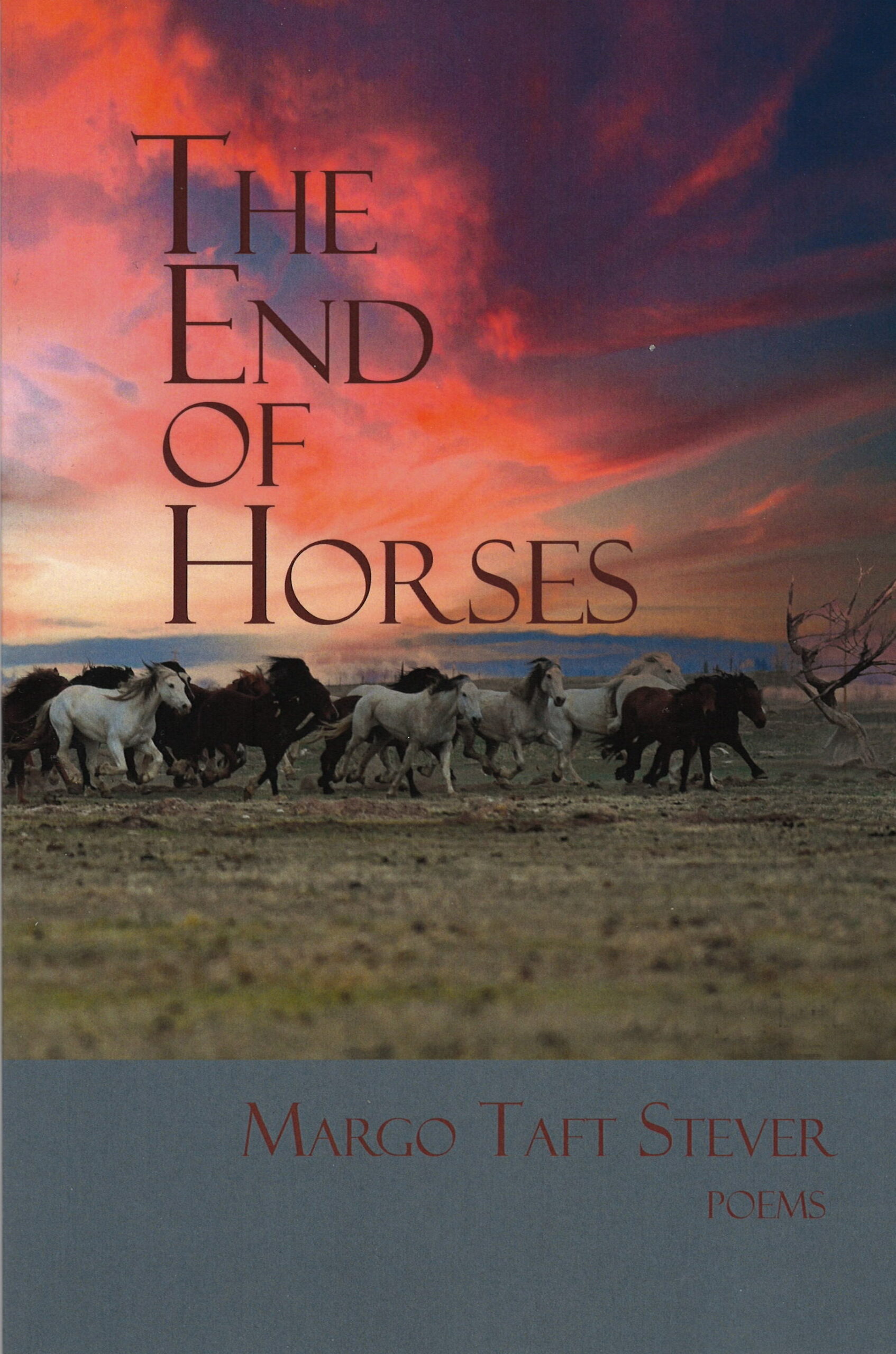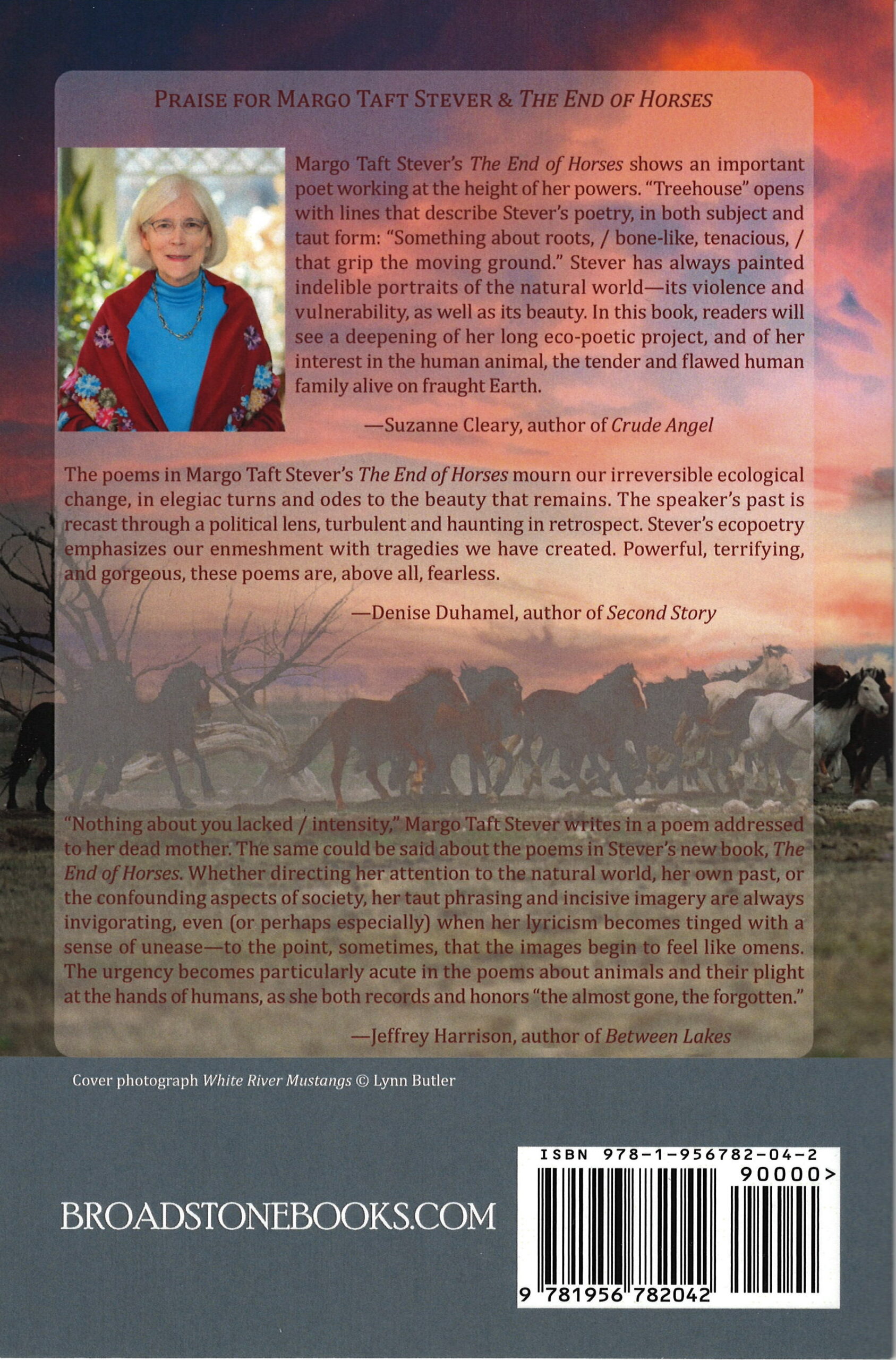 © 2022 Don Yorty. All rights reserved.
© 2022 Don Yorty. All rights reserved.
When I began to read The End of Horses, I enjoyed the first poem immediately. It’s about riding a horse bareback, and if one has never done that, this poem will be a pleasurable facsimile with its quick three line stanzas and tempo reminiscent of a gallop changing landscapes constantly. It brought back childhood memories for me jumping over streams and ducking overhanging branches as they came at us, riding horses through the mountain, with nary a scratch, which is the luck of children.
Galloping Double, Bareback
Down sandy edges of paved
country roads without helmets,
bareback, the sisters clung
to each other, to the horse, to tree-
lined ways that snake around
and through, as if going somewhere
were not the goal. Their bodies
twinned, hair wind-whipped—the triple
rocking of legs pounding,
the leaping beat of hooves. The girls
struggled to stay the horse
rippling though them like storm.
Wind battered trees that framed
the hush of birds, silenced
by their galloping—the muddy paths,
the mourning dove, soft-eyed windows
of distant houses. Head down, the quieted
horse ploughed through grasses.
his massive form sleek, willowy.
So much did they long for the beast’s
velvet nose to be buried in their arms.
“Galloping Double, Bareback” anticipates the empathetic poems that follow and draw us into their natural world where every creature is equal and worthy of notice and attention, and we realize too, if things don’t change soon, these fine serious poems may also be harbingers of our doom. In the Vimeo below, Margo Taft Stever reads some of these poems. Enjoy.
The End of Horses is in three sections. I’ve typed out the following poems from the second and third sections. “Galloping Double, Bareback” is from the first section of the book.
Barefoot Clearing
Outside, troubled
family spills
over the driveway
that I walk down,
barefoot, kicking
my toe against
each stone
firmly lodged
in its own cement
Catalpa leaves
dampen my arms,
and a clearing
appears halfway
between my eyes
and the moon.
Slug Traps
When raccoons begin
their nightly rounds
rummaging
through the fillings
of garbage cans, slugs quit
the dark undersides
of leaves, leaving the emperor
beetle, the common
worm, for the sleek
surfaces of lettuce.
Snails without shells,
sliding along the earth
and its roots,
these cumbrous gypsies
house a human frailty,
thirsting for
an unknown odor,
a formless state.
On a pie plate
full of Pabst,
from all corners
they converge,
forsaking their tracks of slime.
Locked Ward II
Two Canada geese and three goslings
crib grass in a corner patch
triangulated by Redcoat Lane,
Tower Hill Road, and the reservoir.
The goslings nip green shoots
in their narrow constriction,
strangulated strip—downy
feathers fluttering in summer haze.
The geese hover over them, protecting
from menacing cars, blurring by
at breakneck speed, drivers cursing
out windows—pests, vermin.
They turn their radios up—“love,
oh careless love…” But at dawn, no
cars, no noise, all drivers
sleeping, the parents bring
their goslings across the vacant
road to teach them how to swim.
Dance of the Jackrabbit
Jackrabbits by moonlight
jump queerly, in circles.
They leap, turn, scatter—
pirouettes askew. Moonlight
is the force, the jackrabbit
the medium, following language
under the earth. Earth
worms roll over the words.
The slow sounds steam.
Hum of fur,
of skin underneath,
hind legs thumping, always thumping
against the unforgiving ground.

The End of Horses is published by Broadstone Books. You can check it out here:

You can check out Margo Taft Stever’s website here: margotaftstever.com
The Hudson Valley Writers Center and Slapering Hol Press website, the two organizations that Margo founded can be found here: www.writerscenter.org

